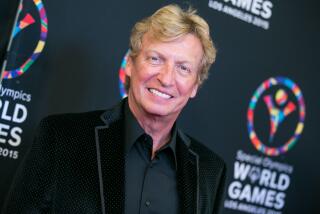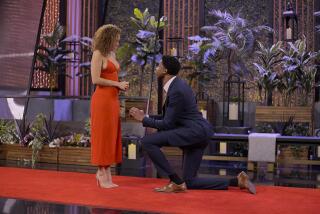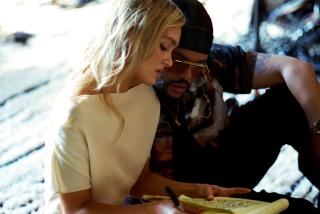‘Idol’ shifts gears into fast forward
- Share via
The Idoldome was a colder, emptier place Tuesday night than it had been a mere week ago, when the most electrifying singer in “American Idol” history, Carly Smithson, still walked among us. In the life of every “Idol” partisan, sooner or later this day must come, when one must look defeat in the eye and search for new reasons to keep faith in the system.
In the end, democracy isn’t simply a way to force one’s candidate into office. The means must be more important than our individual ends, and, bitter though it may be, the will of the electorate must be accepted. Were it not for “American Idol,” we would have never known Carly.
It proved to be an interesting night for moving on and seeking closure, what Simon Cowell called “the strangest show we’ve ever done.” I am not sure how much of this came across on television, but the events were, even by the roaring circus atmosphere of the tapings, fairly frenetic, or as Simon termed it, “chaotic.”
The show started in relative calm. All three judges got to their chairs over a minute before air time -- a rare feat lately. The hardest shows, however, are the ones in which they are forced to squeeze more than half a dozen performances into an hour. At the season’s opening, when there are 12 performances, the shows are two hours. However, when Fox confines the show to one hour Tuesday nights and contestants sing two songs, the result is a show so crowded that it will barely have time to suck in an ounce of fetid oxygen to sustain itself. Considering an hour of programming is approximately 44 minutes of performances, minus the opening credits and introductions, there is only about 39 minutes left for 10 performances, with each slot having to contain the song, judges’ reactions, Ryan Seacrest reading the phone numbers and banter between Ryan and the Idols. The Neil Diamond episode strained to include it all, making the tough call to sacrifice judging during the first round.
Unfortunately, that decision seemed hardest on at least one judge. During the Neil Diamond introductory video package, executive producer Nigel Lythgoe came to the stage and seemed to be explaining something urgent to Ryan and stage manager Debbie Williams. He then raced to the judges’ table and conveyed the message. I guess he said they would not be judging the first round. The news must have alarmed Paula Abdul; perhaps she feared forgetting performances by the time she would have to critique them, because Lythgoe fetched a notepad and pen for her.
Unfortunately, as events would prove, whatever presentiment that led Paula to believe she might need support proved prophetic as, from my vantage point, she seemed to be just reading through her notes and read into the notes she had taken on David Cook, thinking they were for Jason Castro’s second song, not recalling that Jason had sung only once by that point.
Unfortunately, skipping full first-round judging underscored how essential, for all its flaws, and as we saw Tuesday, jaw-dropping gaffes, that judging ceremony still is to the show. After Hollywood week the judges have no formal impact on the results of the show, offering merely nonbinding comments for the audience to consider or disregard. Nonetheless, the judging is the prism through which we view the show. Depending on how you feel about each judge, the judging is what cues viewers as to how they are supposed to feel about what they saw -- the technical values of which they may lack the vocabulary to interpret. I know I do.
In my recent interview with Williams, she recalled that what was unique about the show when it first aired was the effect of Simon’s critiques. “Nobody told the truth on television before that,” she said. Indeed, no show had had the courage to take its main assets -- its stars, in this case, the singers -- and eviscerate them week after week. So much so that the judges became bigger stars than most of the contestants, their critiques awaited more eagerly than many of the songs, and that the panel anchored by a “mean judge” became a genre staple, reshaping prime-time TV. And, further, the spectacle of young people with so much at stake thrown to the lions and seeing how they react became our primary tool to gauge their character.
The hurried first half of Neil Diamond night, sadly, as much as they needed to pack so much into that one hour, was ultimately a ship minus that anchor. I also noticed that spinning globe on stage had stopped revolving. Next week, no doubt as we near the last lap before the finals, the equilibrium will be restored, perhaps even in the results show, when no doubt they will laugh at the foibles of Tuesday and the world shall spin around “Idol” again.
Side note: The big question this season was whether allowing instruments would make a difference. After Hollywood week, it looked as though the effect might be a wash. But at this point, we can say that the inclusion of musical instruments has turned the “American Idol” world on its head and had monumental impact on the contest. Of the Top 12, 3 1/2 candidates played instruments (Brooke White, David Cook, Jason and occasionally David Archuleta). They are still on the show. Further, although they have at times been stellar without instruments, it is almost impossible to imagine Brooke, Jason and maybe David Cook making it this far simply by singing, so central are their instruments to their identities. Which is perhaps why Syesha Mercado seems almost a throwback today. . . . If Diana DeGarmo could see us, would she recognize this brave new world we have wrought?
--
richard.rushfield @latimes.com
More to Read
The biggest entertainment stories
Get our big stories about Hollywood, film, television, music, arts, culture and more right in your inbox as soon as they publish.
You may occasionally receive promotional content from the Los Angeles Times.










